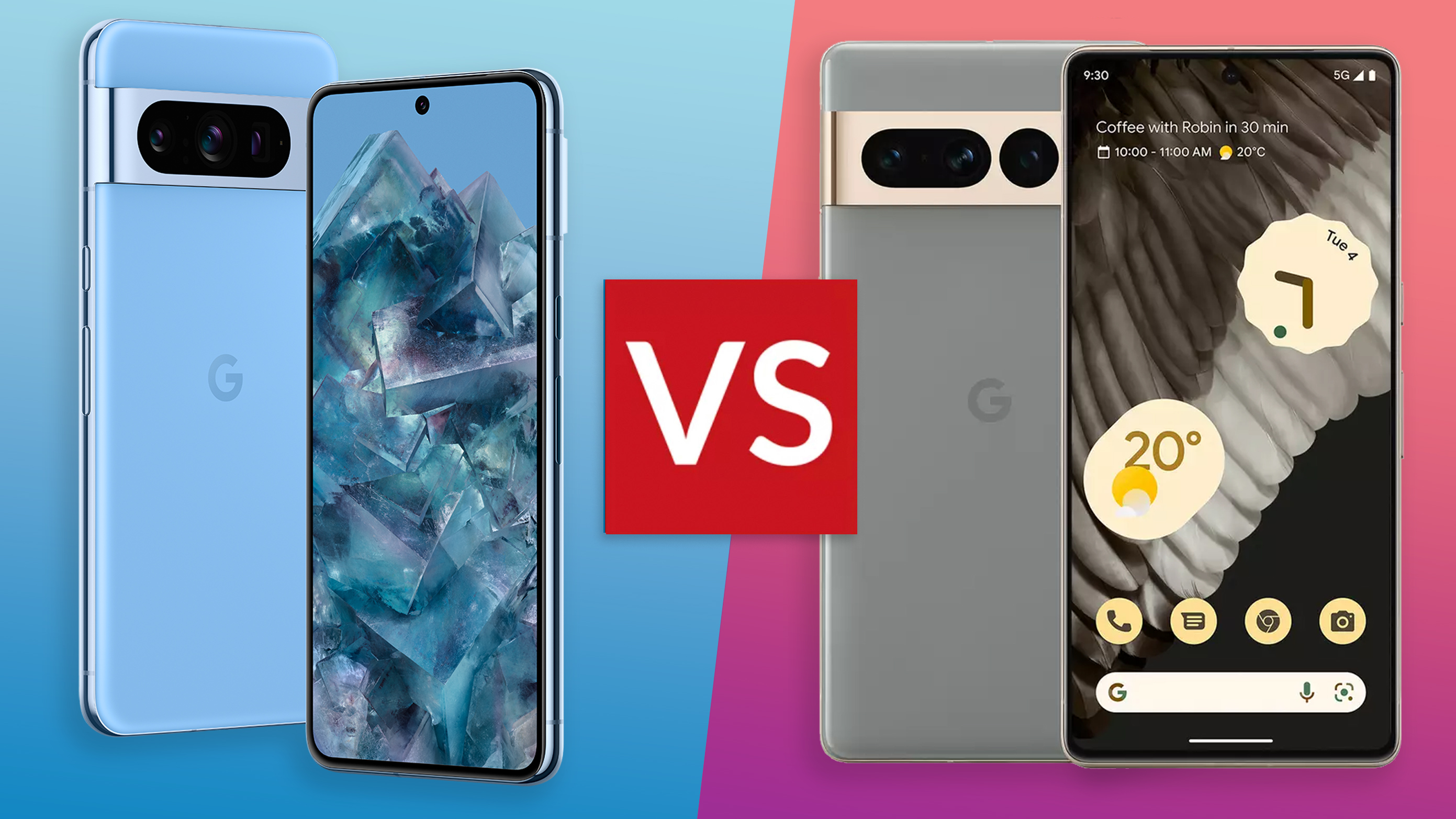Google Pixel 8 Pro vs Pixel 7 Pro: what's new?
Google's new flagship, the Pixel 8 Pro, brings updates galore. But what exactly is new compared to the earlier Pixel 7 Pro?

Get all the latest news, reviews, deals and buying guides on gorgeous tech, home and active products from the T3 experts
You are now subscribed
Your newsletter sign-up was successful
When it comes to the best Android phones, the Google Pixel 7 sits high up the list – indeed, it was T3's Award-winning phone for 2023 – and now its successor, the Pixel 8 Pro, has been officially revealed. Which brings the most obvious initial questions: what's different between the two and if you're a Pixel user is it worth upgrading to the latest model?
I've used the Pixel 7 Pro extensively over the last year, so have stacks of experience in what that phone is all about and why it's one of the best smartphones that money can buy. Here's how that translates against the latest Pixel 8 Pro in all the key areas, for better and arguably for worse, in this detailed versus article.
What's new? In summary
- New: 7 years of Android updates
- New: 'Object Temperature' feature
But first, let me summarise: the Pixel 8 Pro removes the curved screen from its 7 Pro predecessor, instead opting to go flat; it adds the more advanced Google Tensor G3 chip (the next step beyond the G2 before it), plus a baseline 12GB RAM in all models; there are new colour variants; the cameras all receive an upgrade (wide and tele in resolution); and the asking price is higher.
There are additional nuances and details beyond the very long sentence above – I'm not sure I could say all that in one go, which shows there are plenty of advancements for the Pixel 8 Pro – from design tweaks, slightly faster wired charging, the latest Gorilla Glass Victus 2, and a 6.7-inch screen that's far brighter at peak (2400 nits, which is a claimed 42% boost over the Pixel 7 Pro).
There's even a new Object Temperature mode, which can tell you the temperature of a subject in an image (the world is your oyster for that mode, clearly), and a new promise of seven years of Android software and security updates, plus feature drops. That's the skinny of it, below I'll break down each key section to explore the differences between each handset, including bullet-pointed breakouts so you can see at a glance where the differences are highlighted.
Price & Availability
- Pixel 7 Pro (at launch): £849 / €899 / $899
- Pixel 8 Pro (at launch): £999 / €1049 / $999
One of the things I felt that really helped the Pixel 7 Pro stand apart from its core competitors was a price tag that was a good chunk of change lower. The Pixel 8 Pro? Not so much. As you can see above, there's a price jump for the latest generation: in the UK it's a 17.7% rise compared to the previous generation.
Furthermore, the Pixel 7 Pro is now so much lower in price – as low as £695 upon my last Amazon check – that the new Pixel 8 Pro pricing places it in direct competition with its main Android rivals. Even the Samsung Galaxy S23 Ultra costs less at the time of writing.
Get all the latest news, reviews, deals and buying guides on gorgeous tech, home and active products from the T3 experts
Will the Pixel 8 Pro be worth it? If, like most people, you're wrapped into a contract then I'd argue, if you're a Pixel fan, then yes. The month-on-month cost isn't likely to differ substantially. As a buy-outright proposition there's an argument to wait in the hope of some best Black Friday deals, perhaps, but overall a champion flagship that's under the four-figure mark is about right...
Colours & Design
- Pixel 7 Pro: Obsidian, Snow, Hazel
- Pixel 8 Pro: Obsidian, Porcelain, Bay Blue
When it comes to Google Pixel and colourways there's always a fancy shade and name for each generation. I remember when the Pixel 7 was teased, Google did so with various crisp flavours that were actually handed out in small batches (I never got to try any, wah). That model was released in black (Obsidian), white (Snow) and a green-grey (Hazel).
While the Pixel 8 Pro didn't present itself with any snack-based forms for its colour options, the format this year is a mixture of familiar and new: there's black (Obsidian), white (Porcelain), and blue (Bay). It's the last of these that I think gives the Pixel 8 Pro a bit more excitement and verve, although it does look a bit Pixel 7a at the same time...
Display
- Pixel 7 Pro: Curved 6.7in AMOLED, 120Hz, 1600 nits (peak)
- Pixel 8 Pro: Flat 6.7in AMOLED, 120Hz, 2400 nits (peak)
In terms of size the Pixel 8 Pro delivers the same 6.7-inch display scale as its Pixel 7 Pro predecessor. But there are massive changes between the two handsets that make their displays very different.
The most obvious is that the Pixel 8 Pro has done away with any curved edge and now features a flat screen. Yes, flat is back in fashion, so the curved edges of the Pixel 7 Pro are now very much a feature of the past.
Furthermore, while the Pixel 8 Pro's screen delivers the same resolution (1440x3120 pixels) and refresh rate (120Hz; except the 8 Pro can dynamically adapt from 1-120Hz, not just 60/120Hz only), it can do so with much greater brightness (2400 nits peak). That makes the Pixel 8 Pro the brightest Pixel ever!
Hardware
- Pixel 7 Pro: Google Tensor G2 processor, 8GB/12GB RAM
- Pixel 8 Pro: Google Tensor G3 processor, 12GB RAM only
- Both: 128GB/256GB/512GB (8 Pro only: 1TB option)
A new generation almost always comes with new hardware, which is exactly what the Pixel 8 Pro offers: there's Google's own silicon, the Tensor G3, at its core – an update over the Pixel 7 Pro's Tensor G2 chip. Expect bumps in compute and graphics, but also an even greater push towards artificial intelligence (AI) processes.
There's a significant difference for the Pixel 8 Pro too: all models come with 12GB RAM, which is part of the reason it's the only model capable of various new camera modes (more on this below). There's no 8GB model, as with the more entry-level versions of the Pixel 7 Pro. Oh, and an all-new 1TB storage option is also being introduced (if you're feeling extra flush, as that'll cost a packet).
Battery
- Pixel 7 Pro: 23W wired, 23W wireless, 5000mAh battery
- Pixel 8 Pro: 30W wired, 23W wireless, 5050mAh battery
The design tweaks mean a modicum of additional battery space in the Pixel 8 Pro too. Although it's the faster charging that's likely to be more welcome – still nowhere near the speeds of the quickest systems out there, mind. Wireless charging remains in tact with no generation-to-generation upgrade.
Cameras
- Pixel 7 Pro: Main (50MP, f/1.9), Wide (12MP, f/2.2), Tele (5x zoom, 48MP, f/3.5)
- Pixel 8 Pro: Main (new 50MP, f/1.68), Wide (48MP, f/1.95), Tele (5x, 48MP, f/2.8)
One area where I really think the Pixel series excels is with the camera systems. The Pixel 7 Pro's combination of main, ultra-wide and 5x telephoto zoom remains in tact for the Pixel 8 Pro too – except the new devices updates the sensors and optics.
As you can see from the spec above, the Pixel 8 Pro has significantly upped the resolution for the ultra-wide and 5x zoom lenses. Furthermore, however, the optics are significantly improved, with much faster apertures – i.e. more light can enter, which is great for speedy shooting, enhanced blurred background (shallow depth of field) and additional light for improved quality – being another major benefit.
Beyond the physical aspect, however, the Pixel 8 Pro – and not the entry-level Pixel, I must point out – also adds some major new video modes. There's Night Sight Video, for example, which is like the stills version (Night Sight), able to significantly raise the apparent exposure level in very low-light conditions in video. That 12GB RAM and dependence on Google's collaboration of on-device and in-the-cloud processing enable this power-intensive mode to be possible.
Other camera features further engage AI to the next level, such as Best Take. This doesn't simply take multiple shots of a scene and pick the best one: if none are quite suitable then an algorithm will dig through your on-device Gallery and locate face-matches, as applicable, in order to, say, ensure each face in the frame is presented with eyes open, smile in tact. I don't know if that's awesome, creepy, or a bit of both!
Early conclusion
I'm excited by the prospect of the Google Pixel 8 Pro. It's the 2023/4 update of my favourite Android phone of recent times, delivering a flatter and brighter screen, more power across the board, and a more refined camera system.
It is also quite a bit pricier, however, and this could be a sticking point for some potential buyers. But it's not as though it's iPhone 15 Pro Max levels of pricey. Besides, I'm probably swayed enough by the new Bay Blue finish to take the plunge either way... sign me up, Google!

Mike is T3's Tech Editor. He's been writing about consumer technology for 15 years and his beat covers phones – of which he's seen hundreds of handsets over the years – laptops, gaming, TV & audio, and more. There's little consumer tech he's not had a hand at trying, and with extensive commissioning and editing experience, he knows the industry inside out. As the former Reviews Editor at Pocket-lint for 10 years where he furthered his knowledge and expertise, whilst writing about literally thousands of products, he's also provided work for publications such as Wired, The Guardian, Metro, and more.
